
11 Aug How Long Does It Take to Renovate a House? A Comprehensive Guide
Table of Contents
- Introduction
- Factors That Affect the Renovation Timeline
- Typical Renovation Phases
- Planning and Design
- Demolition and Site Preparation
- Construction and Structural Work
- Installation and Finishing Touches
- How to Speed Up Your House Renovation
- Conclusion
Introduction
Renovating a house is an exciting project, but one that requires time, effort, and careful planning. A common question homeowners ask when embarking on a renovation is, “How long does it take to renovate a house?”
The timeline for a house renovation can vary significantly depending on several factors, including the size of the property, the extent of the work, and whether any unforeseen issues arise during the process. In this guide, we’ll explore the key factors that influence the timeline of a home renovation and provide a rough estimate of how long it typically takes to renovate a house.
Factors That Affect the Renovation Timeline
Several key factors contribute to how long it will take to renovate a house. The more complex the project, the longer it will take to complete.
Key Considerations:
- Size of the Property: Larger homes or properties with multiple floors will take longer to renovate than smaller properties. A two-bedroom flat will naturally require less time than a six-bedroom house.
- Scope of the Renovation: Minor cosmetic updates, like painting or re-tiling, will take less time than extensive structural changes, such as converting a loft, building an extension, or replacing electrical systems.
- Work Involved: The amount of work required—whether you’re upgrading fixtures, installing new plumbing, or completely overhauling the space—will determine how long it takes.
- Permits and Approvals: If your renovation requires planning permission or building regulation approvals, these processes can delay the project.
- Contractor Availability: The availability of your chosen contractors and tradespeople can affect the timeline. Delays can occur if they’re booked for other projects or if there’s a shortage of skilled workers.
- Unexpected Issues: During the renovation process, you may uncover hidden problems like water damage, electrical issues, or structural concerns. These issues can extend the timeline as additional repairs are made.
What to Expect:
- On average, a full home renovation will take 2 to 4 months, but some large-scale projects can extend beyond 6 months depending on complexity.
Typical Renovation Phases
The timeline for a house renovation is typically broken down into several key phases. Follow the complete renovation steps here. Each phase has its own timeline, depending on the scope of work and the size of the property.
Planning and Design (2–4 Weeks)
The planning and design phase is where you define your goals, create a design plan, and set a budget. This is one of the most critical stages as it sets the foundation for the entire project.
What Happens:
- Initial Consultation: You meet with architects or designers to discuss your vision, budget, and timeline.
- Design and Layout: Finalise the design and layout for the renovation, selecting materials, colours, and finishes.
- Planning Permission: If required, apply for planning permission and building permits, which can take additional time depending on the complexity of the project.
What to Expect:
- This phase typically takes 2 to 4 weeks, but it can take longer if revisions to the design are needed.
Demolition and Site Preparation (1–2 Weeks)
Once your plans are approved, it’s time to clear the space for the renovation. This includes demolition and site preparation work.
What Happens:
- Demolition: Old fixtures, walls, floors, and any outdated structures are removed.
- Site Prep: The area is prepped for construction, including any necessary foundation work, plumbing updates, or structural repairs.
What to Expect:
- Demolition and preparation typically take 1 to 2 weeks, depending on the size of the property and the amount of work involved.
Construction and Structural Work (4–8 Weeks)
This phase is where the bulk of the work is completed, such as installing new walls, floors, plumbing, and wiring. If you’re adding extensions or structural changes, this is the phase where that work will take place.
What Happens:
- Structural Changes: Adding new rooms, removing walls, or addressing any structural issues.
- Plumbing and Electrical Work: New plumbing lines, electrical wiring, and fixtures are installed.
- Windows and Doors: New windows, doors, and any other major features are fitted.
What to Expect:
- Construction and structural work can take 4 to 8 weeks, depending on the scale of changes being made. Learn the steps in more detail in our guide: Home Renovation Steps.
Installation and Finishing Touches (3–6 Weeks)
The final phase involves installing fixtures, fitting the final details, and completing the finishing touches that make your space shine.
What Happens:
- Cabinetry and Fixtures: Install kitchens, bathrooms, and storage units.
- Flooring and Tiling: Lay flooring, install tiles, and finish any other surface treatments.
- Painting and Decoration: Paint walls, apply finishes, and add any final touches like light fixtures and décor.
What to Expect:
- This phase typically takes 3 to 6 weeks, depending on the number of details that need to be finished.
How to Speed Up Your House Renovation
While some factors are beyond your control, there are several ways to help speed up the renovation process without compromising on quality:
Key Tips:
- Plan Ahead: Ensure that all design decisions, materials, and contractors are finalised before the work begins. This prevents delays from indecision or waiting for supplies.
- Hire Experienced Professionals: Skilled contractors and tradespeople can complete tasks more efficiently, helping to stay on schedule.
- Avoid Major Changes Mid-Project: Once the renovation begins, try to avoid significant design changes or delays in decision-making to prevent extending the project timeline.
What to Expect:
- With proper planning, you may be able to shave a few weeks off the renovation timeline, but it’s important to remain realistic about how much time is required for the work.
Conclusion
The time it takes to renovate a house can vary greatly depending on the scope of the project, the size of the property, and the complexity of the work. On average, a home renovation will take 3 to 6 months to complete, but larger projects could extend beyond 12 months.
Understanding the renovation process and what to expect at each stage can help you plan ahead and make informed decisions. Whether you’re updating a few rooms or completely overhauling your home, the key to a successful renovation is careful planning and choosing the right professionals for the job.
Ready to renovate your home? Contact us today to discuss your project, and let us help you bring your vision to life within your desired timeframe.

No Comments